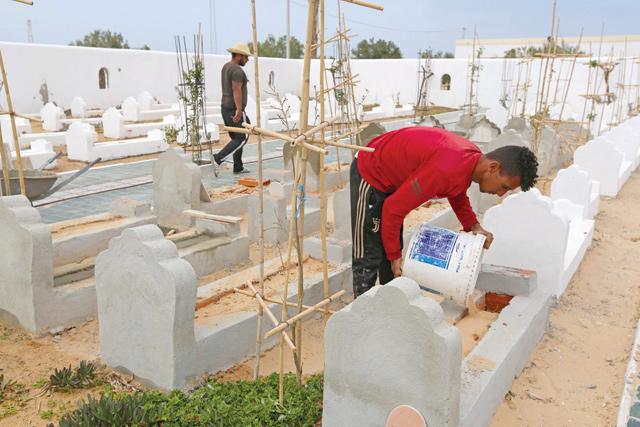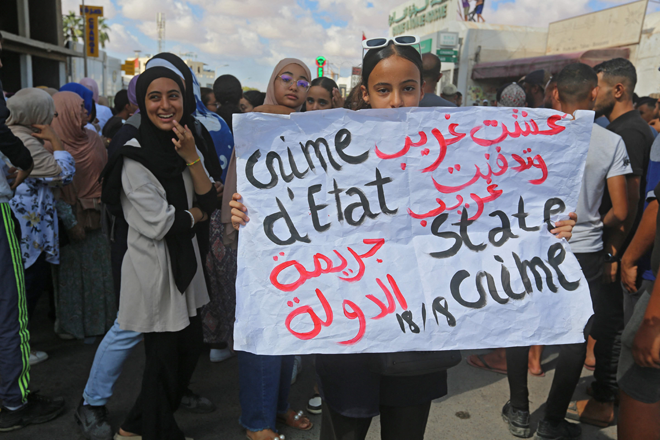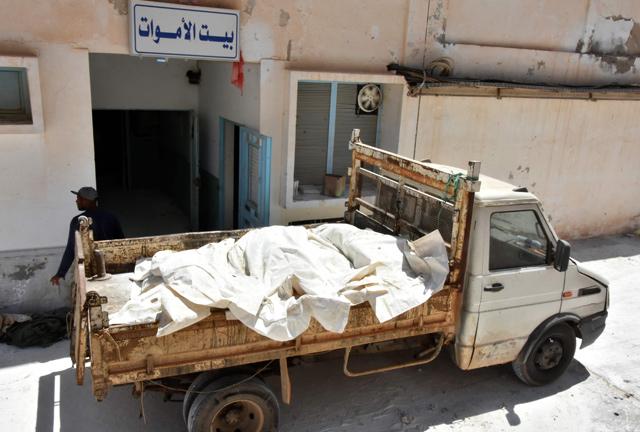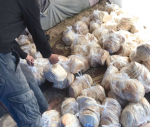You are here
Tunisian ex-fisherman buries migrants who drowned at sea
By AFP - Aug 16,2017 - Last updated at Aug 16,2017
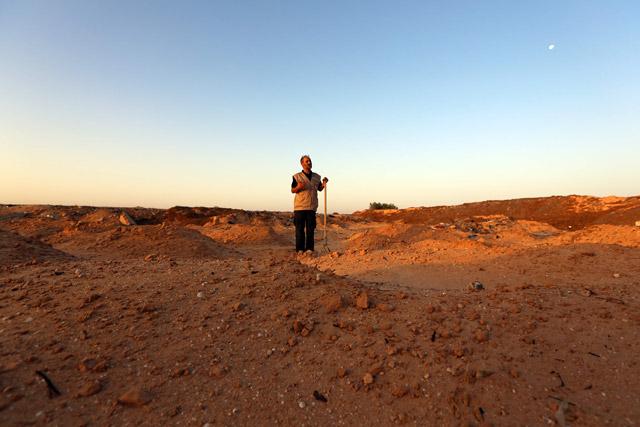
Unemployed former fisherman Chamseddine Marzouz stands in the middle of a make-shift cemetery for migrants on July 12 in the Tunisian coastal twon of Zarzis (AFP photo)
ZARZIS, Tunisia — Armed with just a spade, Chamseddine Marzoug is determined to give a dignified burial to migrants who drowned in waters off his Tunisian hometown trying to reach Europe.
On a patch of sandy wasteland outside the southern port town of Zarzis, the 52-year-old takes a rest from digging two graves under the scorching sun.
In recent years, neighbouring Libya has become a key departure point for tens of thousands of migrants trying to cross the Mediterranean to what they hope will be a better life in Europe.
Thousands have drowned during the dangerous journey after paying human traffickers to board often overcrowded and unseaworthy boats.
"Just because they took part in an illegal crossing — driven to it by misery and injustice — doesn't mean that they don't deserve to be buried with respect and dignity," says Marzoug.
The unemployed former fisherman, who also previously worked as a driver for the Red Crescent, says he has buried hundreds of dead migrants in the past 12 years.
Off Zarzis, Tunisian fishermen have found themselves on the frontlines of a human tragedy in waters on a route from Libya to Italy.
The fishermen are usually the ones to call the authorities after spotting boatloads of migrants in trouble, and often also help to rescue them.
"You go out to earn a living, but then come back with migrants instead of fish," says Chamseddine Bourassine, the head of the local fishermen's association.
Makeshift cemetery
"You can't stand by and watch people die without doing something", he says.
Since the start of this year, 126 people of different nationalities have been rescued in the waters off Zarzis, according to official figures.
But the bodies of 44 migrants have also been retrieved.
Tunisia's coastguard often rescues migrants from sinking vessels and even pulls the drowned from the sea, but says burying the dead is beyond the call of duty.
"The coastguard units are in charge of ensuring security in this area bordering Libya," says Sami Saleh, head of maritime operations in Zarzis.
"They're not rescue units and aren't equipped to retrieve dead bodies. With our limited means, our officers do the best they can, but burying the dead is not part of our duties."
In waters bordering chaos-ridden Libya, Saleh says the coastguard has more important concerns.
"We need to check if there are any suspicious individuals, weapons or explosives," he says.
The lack of a specifically tasked authority is just one of the obstacles to giving the migrants a dignified burial.
Mongi Slim, head of the local branch of the Red Crescent, says there is also a "cemetery problem".
People "don't accept to bury strangers in their family plots" in cemeteries that are already overflowing, he says.
Instead, Marzoug has obtained official permission to bury the migrants in a makeshift burial ground far from the town's homes and next to a garbage dump.
'Seared into my brain'
Near an open grave, a black body bag lies on the sand beyond empty bottles and other trash.
Mounds of sand are the only indication of the people laid to rest in the stony terrain.
The graves are simple and unmarked, but their self-appointed digger — whose own son has made the sea crossing to Europe — remembers each and every one of their occupants.
In one grave lie two children, aged around four and five when they died.
In another rests a woman pulled from the sea, her head missing.
In yet another is a man found with an arm missing.
"The images of the bodies, especially those that were decomposing, are seared into my brain. It's not easy," Marzoug says.
But "we need to consider them as our children, our brothers and sisters", he says.
Marzoug has called on the authorities to set up what he calls a "real" cemetery for the migrants who died at sea.
"This isn't just a Tunisian issue. It concerns all of humanity," he says.
"I ask the whole world for a decent cemetery where we can bury the migrants properly, with a room for washing their bodies and the means to transport them," he says.
The Red Crescent is "looking for a plot of land to buy" for this, Slim says, and plans to appeal for donations in Tunisia and abroad.
"We will give them a dignified burial."
Related Articles
ZARZIS, Tunisia — A cemetery in southern Tunisia for migrants who drowned crossing the Mediterranean in the hope of a better life in Europe
ZARZIS, Tunisia — Thousands of Tunisians demonstrated and a general strike shut down the coastal city of Zarzis on Tuesday to demand a renew
GABES, Tunisia — A putrid odour lingers outside a morgue in Tunisia's coastal city of Gabes as dozens of bodies of would-be migrants to Euro


